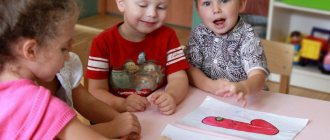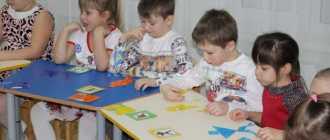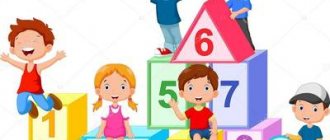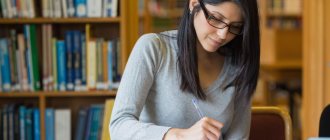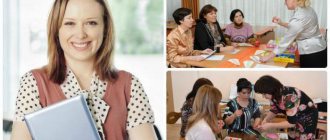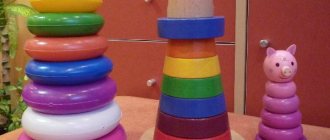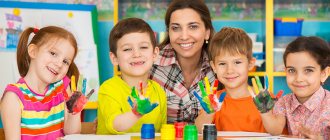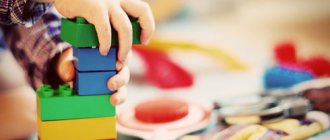Learning math by playing
The main emphasis is on the game. I won’t tire of repeating my thought, of course, that only by playing can a child be able to naturally learn anything.
For example, a teacher’s plan for mathematics according to the Federal State Educational Standard should even be called something beautiful: “A magical journey into the land of numbers.” How do you like it? It is already clear that there will be nothing scientific or standard.
The teacher comes up with a whole performance for each lesson, prepares interesting and colorful visual materials, provides physical education lessons, and does not forget to sing and listen to music with the children. And at the same time, in the end, children learn to count and compare quantities. Along the way, they study the basics of geometry - shapes, segments, length, height. Children work in class no less than in school, believe me, they just don’t notice it, classes are not a burden to them.
Self-education of a teacher in mathematics is a creative process, studying the experience of other teachers, developing one’s own methods and forms, creating a didactic base and a favorable environment for learning and the comprehensive development of students.
The teacher makes a report on the topic in the form of presentations for colleagues and parents. You can arrange a theatrical performance for children, for example, come up with a fairy tale about numbers or weave elements of mathematics into a familiar plot (the same Kolobok).
I hope it wasn’t too chaotic for me to speak about the pressing problem? I look forward to your assessment and comments!
And if you liked my opus, show it to your friends on social networks, and also invite “fresh” subscribers!
Best regards, Tatyana Sukhikh! Till tomorrow!
Let's not let our children grow up too early!
In general, today there is an acute problem of excessively high demands on children, even in kindergartens. We, educators, also sin by using methods and forms that do not correspond to the level of our students, their capabilities, characteristics of the brain, memory, and perception.
Many preschool teachers make a report on the work done to their parents in the form of a kind of examination of the children in arithmetic... Parents, of course, are happy - after all, the children show brilliant knowledge, but do not think about why this is necessary in kindergarten.
The pace of development of preschool children is unduly accelerated without taking into account natural processes. If only they could read well, solve problems, show genius, supernatural talent... The topic of discrepancy between the requirements of preschool educational institutions and sensitive periods of children's development is not new, but does not lose relevance. Both belated and premature training in relation to the age characteristics of children are equally ineffective and even harmful.
In my opinion, a teacher’s plan for self-education in mathematics should include a mandatory element - the search for non-traumatic forms of teaching children the initial concepts of exact science.
For educators and parents, a virtual pedagogical repository of knowledge...
The Internet portal “Labyrinth.ru” will delight you with a very extensive selection of aids for preschool children’s introduction to counting. I will definitely find books from the “Mathematics in Motion” series useful. An interesting idea is presented here - to teach the basics of exact science in parallel with health-improving and developmental activities. That is: we run, jump and learn to count!
“OZON.RU” offers an equally large range of manuals and specialized literature. Excellent manuals for educators - a math plan for the school year, lesson notes, workbooks - everything you need for fruitful work with preschoolers.
“UchMag” suggested to me an excellent book, “Mathematics in Kindergarten,” the main idea of which is that it is important not only to teach a child to count quickly and correctly, but also to maintain a strong interest in science. In preschool age, we form the basis for further successful education at school.
Who is to blame and what to do?
It is clear that teachers are not to blame, so to speak, that strict limits are set before them. But under the guise of non-standard teaching, why not introduce at least a game form of a math lesson for first-graders? And not from time to time, but constantly, until the children get used to the carefree stay in the kindergarten.
What does self-education involve as a mathematics teacher? In improving one’s own professional level, searching for new effective methods of teaching the subject, ways to develop students’ creativity and curiosity. That is, the tasks are the same as those of a kindergarten teacher. This means that it is logical that the forms and methods of teaching should flow smoothly from preschool to school level without jumps, without stress for children.
Self-education of a kindergarten teacher in mathematics involves, first of all, the development of game forms, and only then the implementation of educational tasks. At school it can be the other way around - learning comes first, but playing is necessarily second or in parallel.
While I was writing the material, I nevertheless found a recommended topic on the Federal State Educational Standard for a primary school teacher, which calmed me down a little, although modestly at the end of the list it stands: “The interaction of play and educational-cognitive activities in primary school.” So, not everything is as bad as it seems to me...
The contradiction between kindergarten and secondary school...
Have you ever wondered why it is so difficult for most first-graders to get used to school from the first days? I'm interested in your opinion! Did you yourself miss kindergarten when you were in school? My son gets nostalgic, sometimes. He doesn’t have enough breaks to rest, he’s stressed by numerous homework assignments, he’s worried about fear of strict teachers, etc. “Eh, why didn’t I like to sleep in kindergarten?” - sometimes he sighs...
I am sure that it is not only sudden changes in the daily routine, lack of daytime sleep, and the presence of “homework” that make the life of a first-grader so difficult.
It seems to me that the main thing that is taken away from a child is play. So I came across a plan for self-education by a 1st grade math teacher. And what do I see there? Innovations in pedagogy, a scientifically integrated approach, new educational standards, generating ideas... My God, these are first graders! They still have to play, they haven’t stopped being children!
Why do we pay great attention in kindergarten, as you may have noticed from my articles, to game moments, learning through games, role-playing games, but at school we completely deprive little schoolchildren of the opportunity to learn in the way they are accustomed to? As soon as the child crossed the threshold of the school, he immediately became serious and assiduous, right?
So the standard report on self-education of a mathematics teacher contains mainly theses about the implementation of educational tasks, but as for creative development, creative thinking, communication, interaction with the teacher, non-standard teaching methods, including in the form of a game - there is not a word.
Maybe I'm wrong? Dear teachers, correct me if I'm wrong!
